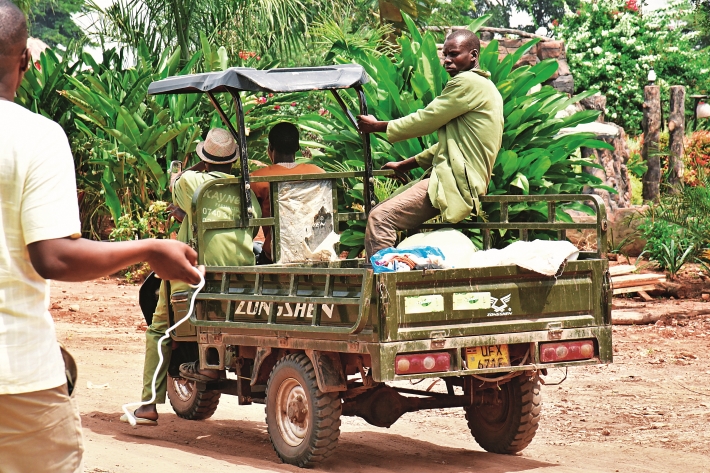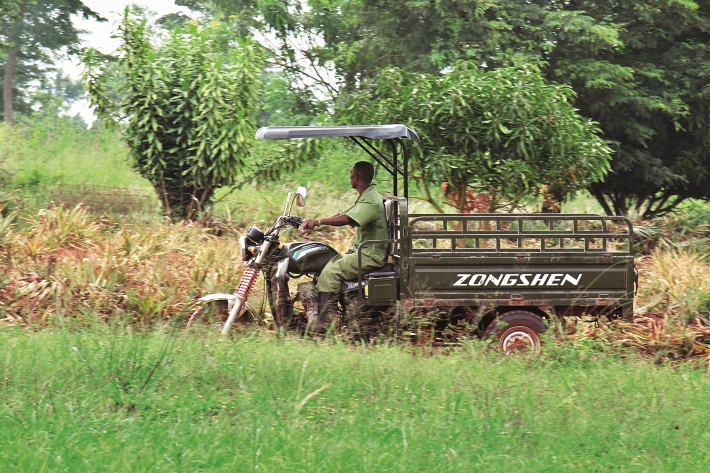|
||||||||||
| Home Top News Economy/Tech Culture/Sports China in Foreign Eyes Green Development Videos Intangible Cultural Heritages |
|
||||||||||
| Home Top News Economy/Tech Culture/Sports China in Foreign Eyes Green Development Videos Intangible Cultural Heritages |
| ChinAfrica |
| Convenience on Three Wheels |
| China-made motor tricycles are transforming the way goods and people are transported in Uganda |
| By Godfrey Olukya | VOL. 16 August 2024 ·2024-07-30 |

China-made tricycles are revolutionising transport in Uganda (GODFREY OLUKYA)
In most cities, towns and villages in Uganda, China-made motor tricycles have become a game-changer for commuters and entrepreneurs alike.
Locally called tuku tuku, the motorised tricycles have revolutionised transportation in not only the highly populated cities and towns, but also rural areas. On roads across the country, they are a common sight carrying luggage, people and animals.
“Uganda has seen a significant import of China-made tricycles in recent years. They have become popular in the country due to their affordability and versatility. They can easily move through crowded roads, streets and even narrow village roads,” said Fred Byamukama, Uganda’s minister of state for works and transport.
Ubiquitous three-wheelers
The use of motor tricycle transport in Uganda is a relatively new phenomena, being only about nine years old. China-made motor tricycles can be found at various dealerships and showrooms in major cities, and even through online marketplaces.
According to a local dealer of tricycles in Jinja City, Andrew Kwasi, the few tricycles in the country before 2015 were mostly made in India and were very expensive, making them unaffordable for many. “[Back then] they were used by a few businesspeople to transport their merchandise to shops, but now, they are common throughout the country,” Kwasi told ChinAfrica.
Susan Kataike, spokesperson of Uganda’s Ministry of Works and Transport, told ChinAfrica that indeed tricycles play a big role as far as transport in Uganda is concerned.
“Tricycles have become an important medium of transport in the country. That can be testified by the local people who mostly use them. Any means of transport that eases movement of people and luggage is appreciated by our ministry,” said Kataike.
According to Ali Kasirye Nganda Mulyanyama, mayor of Makindye Division of Kampala City, tricycles have become the quickest and most affordable means of transport in crowded cities in the country. He confirmed that even in the villages, they are important means of transport.
“Tricycles can easily go where vehicles can’t go, especially on our narrow potholed roads. In town, they are mostly used to carry luggage; but in villages, they transport people from one place to another,” he said.
Many uses
Entrepreneurs have also capitalised on the trend, using tricycles to transport goods and services to remote areas.
William Rwanyaga, a dealer in pineapples in Kampala central market, told ChinAfrica that he uses his tricycle to ferry the fruit from Kayunga District, where he buys them, to Kampala every day, covering a journey of about 65 km.
During the dry season they are used to ferry water to homes and places like poultry farms where it is most needed. Dozens of jerry cans full of water can be seen loaded on the back of tricycles buzzing about delivering their cargo.
In some rural places with narrow roads, tricycles have been converted into ambulances. Several health organisations in rural areas use them as ambulances to ferry the sick to referral hospitals.
The impact on the community has been profound. Commuters can now reach their destinations quickly and safely, while small business owners have seen a significant boost in their trade.
Kampala City Council Authority Spokesperson Daniel Nuwebiine said, “As an authority, we have not yet registered the number of tricycles in the city, but there are thousands. They have definitely made an impact on the transport system in the city and other parts of the country,” he said.
While addressing the nation recently, Uganda’s President Yoweri Museveni said that one of the positive impacts of motorcycle and motor tricycle transport is that it has created many jobs, especially for the youth.
Carrying luggage and passengers is also a favoured use of tricycles. Molly Bisaso has been operating the vehicles in Kampala for the last five years. “For me, operating tuku tuku is a very good job. I use it for transporting luggage and passengers and have saved enough money to look after my family and pay school fees for my children,” she said.
Farmer Luis Balyeku in central Uganda district of Nakaseke said ever since he bought his tricycle, his farm’s revenue has improved a lot because he can easily go to town to buy inputs for his farm as well as take his produce to market.

Tricycles are able to run on various road conditions (GODFREY OLUKYA)
Low maintenance
On average, a new motor tricycle in Uganda costs 8,500,000 Uganda shillings (about $2,303). At first the tricycles were imported directly from China. But currently, they are assembled in Uganda. Liu Dianzuo, one of the Chinese businessmen who deals in tricycles in Uganda, said sales are good because many Ugandan businessmen and farmers are buying them to use as transport vehicles. Some dealers from South Sudan, Burundi and the Democratic Republic of the Congo also buy from Ugandan dealers.
Mayor Mulyanyama said that operators of tuku tukus contribute substantially to the development of the country through paying taxes. “Some of the taxes are indirect while others are direct. Every day, a tricycle uses over 4 litres of fuel; but on each litre, there is a tax of 1,450 Uganda shillings (about $0.4). Each month, a single operator pays fuel tax of over 200,000 Uganda shillings (about $54.22).”
He said that apart from providing jobs to the drivers, they also provide work for mechanics, those who wash them and those who sell oil.
Meanwhile, Hassan Tukwaire, chairman of Tricycle Transporters in Kampala, said Ugandans have embraced tricycles from China because of several factors. “They are durable and they are sold at affordable prices,” he said.
Spare parts are readily available at affordable prices, and they are an affordable alternative to cars and motorcycles, requiring minimal maintenance and fuel costs, said Tukwaire.
Pastor Solomon Male, political and social affairs analyst, said the tricycles have been embraced by Ugandans because they are generally safer than bicycles, with three wheels providing greater stability and balance. “Tricycles require minimal maintenance, with fewer parts to repair or replace. They are space-efficient, making them easy to park and store in small areas. They offer a versatile, practical, and enjoyable mode of transportation that suits various needs and purposes.”
He concluded that generally the tricycle has become a symbol of ingenuity and progress, transforming the way people live, work, and move around.
| About Us | Contact Us | Advertise with Us | Subscribe |
| Copyright Beijing Review All rights reserved 京ICP备08005356号-5 京公网安备110102005860号 |